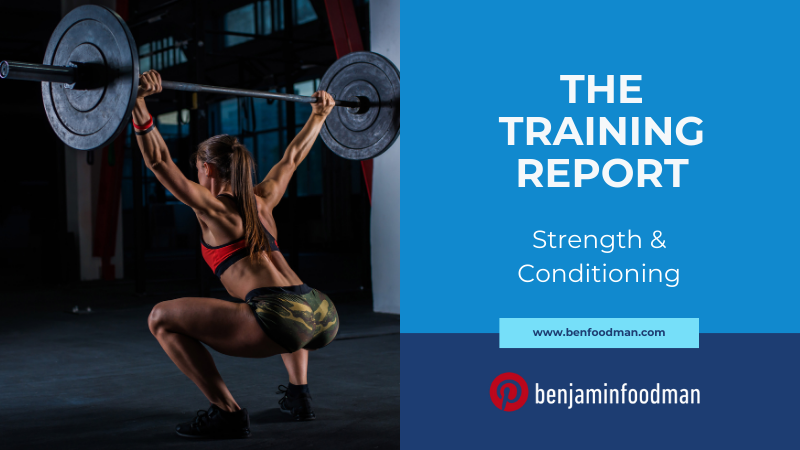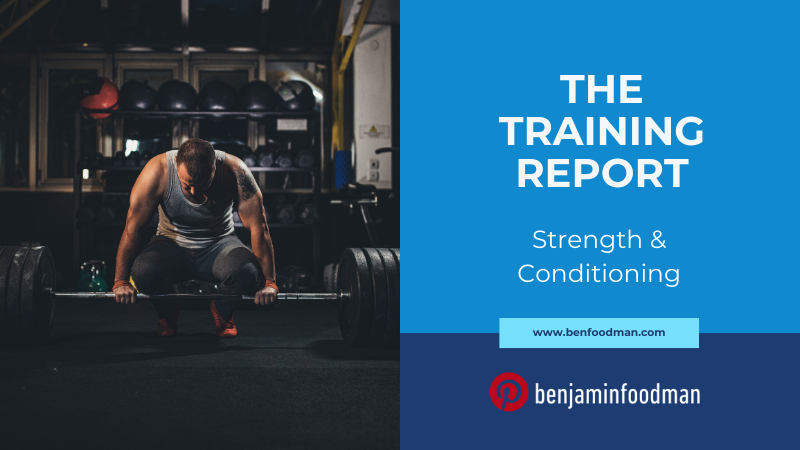Strength & Conditioning - Kettlebell Workout
About the Author
Ben Foodman is a licensed psychotherapist & performance specialist. He owns his private practice located in Charlotte North Carolina where he specializes in working with athletes to help them overcome mental blocks (the yips), PTSD, ADD / ADHD and achieve flow states through the techniques of Brainspotting & Neurofeedback. If you are interested in services, use the link here! Enjoy the article below!
Part I. Kettlebell Training & Athletes
Over the course of my career I’ve found that while many athletes want to use kettlebells, they are hesitant to start training with them because they aren’t quite sure what exercises they should select with the kettlebell. For today’s training report I want to provide a sample kettlebell training session that you can use as a general point of reference. I will breakdown each component of the training session and review some of the research around training with kettlebells. You will need at least 3 different kettlebells of varying weight for this training. I rank the difficulty of this program as a moderate session. Novice kettlebell users should focus on more simple movements which we will discuss later in the report.
WARM UP
Arm circle rotations clockwise & counterclockwise + hip bridge with resistance band + plank with shoulder touch + psoas march with resistance band
2 rounds, 10 reps per movement, 10 reps per joint for single joint work (e.g. 10 marches with left leg, 10 marches with right leg)
POWER DEVELOPMENT PHASE
Single-arm kettlebell snatch
Work up to 3 x 5 reps per arm at 8/10 intensity level
STRENGTH DEVELOPMENT PHASE
Superset I - Kettlebell Swings + single-arm rows
Work up to 3 x 10 at 8/10 intensity
Superset II - Kettlebell Sumo Deadlift + Kettlebell front load carry
Work up to 3 x 10 at 8/10 intensity
ACCESSORY PHASE
Turkish Getups
Work up to 3 x 3-4 at 7-8/10 intensity
Double Windshield Wiper
Work up to 3 x 8 leg passes
Single-leg RDL
Work up to 3 x 8 at 8/10 intensity per leg
Part II. Exercise Science Behind Kettlebell Training
Whenever you are going through a training program you always need to be reviewing with yourself ‘why am I doing what I am doing’. There needs to be purpose and meaning behind your actions in the gym, otherwise you’ll never move in any significant direction towards your goals. First, when we look at the warm up we’re focused on core activation and getting the muscles that will be most in use during this training session back online. Next, the power development phase should always be programmed in the beginning, because complex movements such as a kettlebell snatch require the highest quality central nervous system activity, and if you are fatigued during this lift you will not be as effective in proper execution.
Moving on to strength development phase, these are multi-joint movements with a heavy emphasis on large muscle groups. Research has shown that when athletes train the large muscle groups (such as the legs) there is an significant increase in testosterone production, ultimately helping make the athlete more anabolic. Next, the accessory phase incorporates three of my favorite kettlebell exercises, the Turkish getup, single leg RDLs, and double windshield wipers. Again, heavy emphasis on core strength but also unilateral stabilization and joint strengthening. Research suggests that when athletes combine bilateral with unilateral exercises there appears to be a synergistic effect where each type of movement improves strength outcomes of the other (e.g. single leg movements increase strength output for bilateral movements such as squats).
Novice lifters should start with a very light kettlebell and focus exclusively on technique. For someone who is new to kettlebell work, I would first cut out the snatches, kettlebell swings, and Turkish getups. This will allow the athlete to focus on more simple movements and properly engage the muscles that need to be engaged. Once the athlete feels confident in their abilities I would then slowly move up in weight and then eventually work towards the more complex movements. In conclusion, I highly recommend that all athletes at all skill levels train with kettlebells. Kettlebells are highly functional in terms of use, storage, and space requirements to utilize them. Remember, this is only a sample microcycle and kettlebell training will be far more effective when a long-term macro/meso-cycle is designed.
Note To Reader:
If you are an athlete reading this segment of the TRAINING REPORT, hopefully this content was helpful! I put the Training Report together because I felt like many of the discussions on issues such as the Yips/mental blocks, strength training & other subject matter on athlete performance concepts were really missing the mark on these ideas (e.g. how trauma is the direct cause of the Yips). If you are interested in learning more, make sure to subscribe below for when I put out new content on issues related to sport psychology & athlete performance! Also, if you are looking to work with a mental performance specialist, you are in the right place! USE THIS LINK to reach out to me to see if my services are the right fit for your goals!
ARE YOU ON THE LIST?
Make sure you’re signed up to Ben’s mailing list to receive news & updates on new strategies in sport psychology, upcoming workshops & products. Don’t wait, sign up now!


























